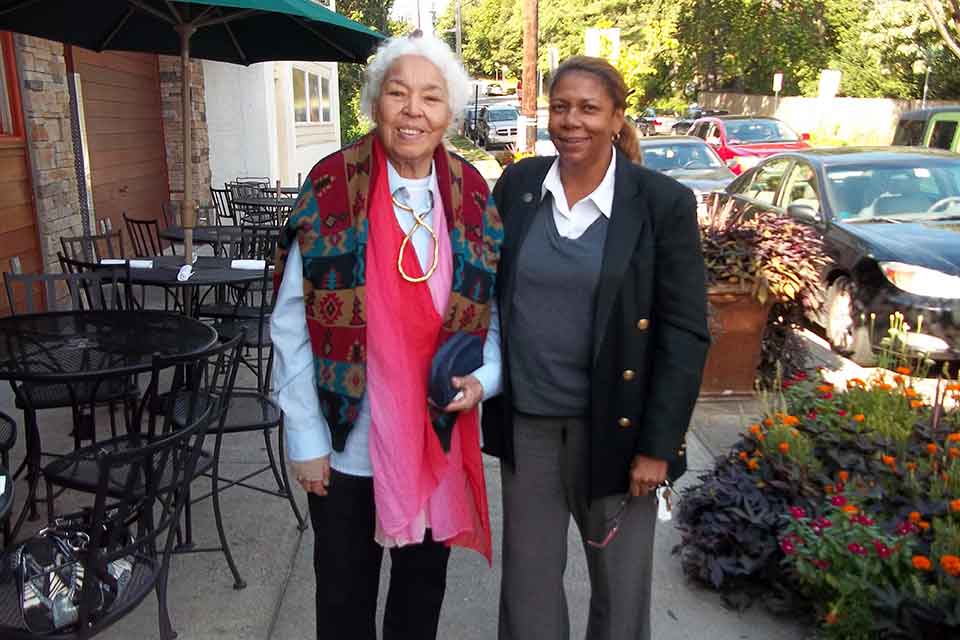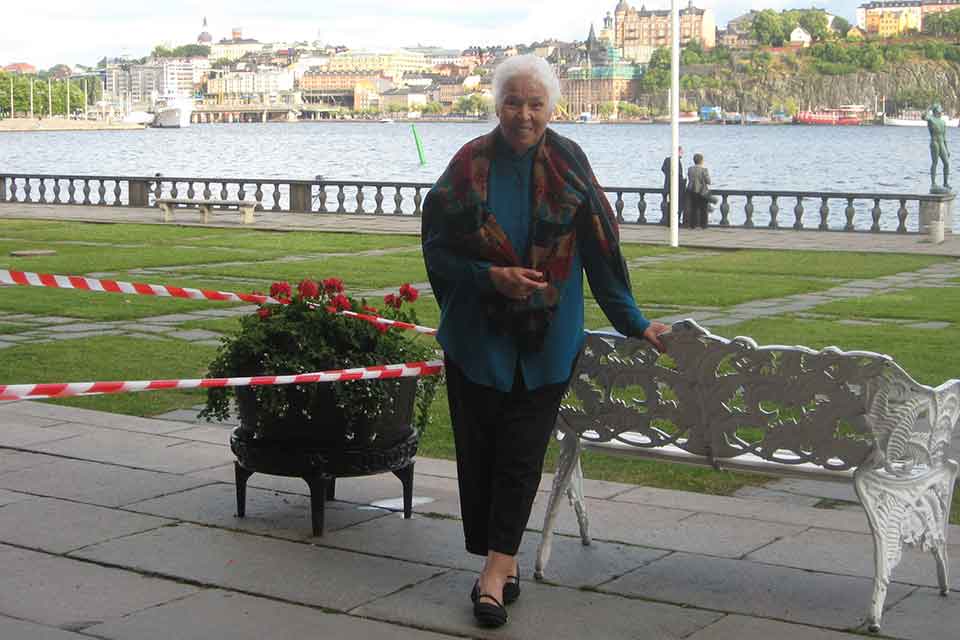It is a herculean task to attempt to capture essence of the writer, physician, and global activist Nawal El Saadawi. There is so much to say, the little things and the bigger things, and in tandem they still don’t equal Nawal. The author of more than fifty books died at the age of eighty-nine on March 21, 2021.
My first direct contact with Nawal El Saadawi occurred on March 14, 2007, and I have retained the first email she sent to me. Her yahoo.com email address would float into my inbox often during the course of our friendship. I created a folder just for her in my inbox. Although she was not a typist, Nawal could fire off an email message quicker than a court stenographer. Using her two index fingers, she would strike the keys as though delivering a poignant point. I could see her brain working as she typed away.
I met her on April 16, 2007, at the airport in Springfield, Missouri. She was seventy-five years old at the time. She had been invited to give a series of lectures on creativity and dissidence at Missouri State University. Her thick mane of curly, shocking white hair, cut just above the neck, her smooth brown skin, and her petite stature did not fit the image of the firebrand that I had concocted in my head. Her walk was purposeful in her brown running shoes. She looked directly at me as she approached. Her eyes sparkled and her smile was warming; “Hello, I am Nawal,” she said, in a voice melodious, deliberate, and strong. So what I remember best about Nawal are her eyes, her unwavering gaze. She was unafraid.
What I remember best about Nawal are her eyes, her unwavering gaze. She was unafraid.
She once told me that “People don’t like my politics.” She was imprisoned in 1981, with a group of liberals who were charged with conspiring to overthrow the regime of Anwar Sadat. After she was released, she told Hosni Mubarak that she would sue him for unwarranted incarceration. Her name appeared on a fundamentalist death list that forced her to abandon Egypt in the early 1900s. In 2001 an Egyptian attorney filed a civil case that would forcibly divorce her from her husband, Sherif Hatata, in response to reports that she called the annual pilgrimage to Mecca a pagan practice. She wrote an article supporting the position of her daughter Mona Helmi’s article (2007) that suggested naming children according to the maternal, not only paternal, line. In 2008 she was accused of apostasy, and her books were banned in Egypt. She was accused of insulting Islam in her play God Resigns at the Summit Meeting. One of the most amusing anecdotes she shared with me was of her bid for president. Of course, she said, she knew she would not win, but she felt compelled to add her name to the pot. In 2004 she announced her plan to run in the Egyptian presidential elections of 2005, to which the Egyptian clerics objected. Her response to the clerics who were opposed to women serving as president of the state:
Because of her physiological qualities and because of the suffering she experiences during her period. Period? God of the university, did menstruation stop Margaret Thatcher from being the prime minister? Does her period stop an Egyptian woman from toiling in the field just like men from sunrise to sunset? After all, even pregnancy and giving birth do not stop the women who work in the fields and offices and embassies. It’s funny that these clerics mention “menstruation,” because every woman active in politics here or in a presidential election campaign is over the age of fifty, so where is the problem with menstruation?
She also had a biting sense of humor. Once she told me how she loved India. She had traveled there with then-husband Sherif Hatata for a conference. She said she loved Indian people and their food. She even expressed a spiritual kinship of sorts with them. So one night, she and her husband were returning to their hotel after dinner. She said that a man beckoned to him to speak privately. She could hear the man offer to get him a girl, any type of girl he wanted. After excusing himself from the man, Nawal said she walked toward the man and asked, “What about me? Do you have a girl for me?” The man responded by scurrying away. The incident echoes a scene in her play God Resigns at the Summit Meeting (2012) during which the daughter of God challenges him, “Why only recognize male children?”
Nawal had a facility for languages. She spoke English, French, and was conversant in Italian. However, she only wrote in Arabic, calling it the most beautiful language in the world. Once at a conference session in Stockholm, she pretended that she didn’t speak English well and asked the audience to direct their questions to me—as though I could translate them into Arabic—which I could not. Months later, I figured it out. She trusted me to rephrase the questions with a clear sign of the questioners’ intent. As she was by this time familiar with my voice and thought pattern, and I suppose she trusted me. Nawal did not trust many people. Men in government were perennially suspect. She called publishers “thieves,” and she once told me that I should quit my job. “If I had a boss,” she explained, “I would kill him.”
She also had an opinion on everything. At dinner she observed, “Americans can take doggie bags home, in Egypt it is frowned upon.” She forever questioned both the practical and philosophical inequities of her environments. In the case of doggie bags, she was speaking to the massive food portions served at American restaurants. That is, it wasn’t just rhetoric with her. She also pronounced professional sports the “opium of the people. It distracts them from important issues affecting them.” She was not a sports fan. However, in 2011 I did manage to get her to go to a Morgan State University football (American) game with me. She was more impressed with the band than the game itself.
After her introduction to the evening event at Missouri State University in 2007, she stood before the audience (not behind a podium) and certainly not seated in her designated area. “Turn down the lights,” she ordered, referring to the spotlight that outlined her form on stage. “I want to see who I am speaking to.” She began:
I am African from Egypt, not from the Middle East. The Middle East is a term used relative to London so that India becomes the Far East. I am not from the third world. There is one world that is a racist, capitalist economic world. . . . I became a feminist when I was a child, when I started to ask questions to become aware that women are oppressed and feel discrimination. (April 2007)
As she had expected, she held the auditorium of university and community people spellbound for the duration of her ninety-minute lecture. She didn’t speak from notes, and she didn’t exactly lecture. I suspect that her texts were derived from what was currently at the forefront of her thoughts. Even when fatigued, Nawal could go on espousing her beliefs as though her words fueled her energy. Her favorite topic at the time was George Bush “the father” and Bin Laden. She referred to them as twins.

“If I don’t tell the truth, I don’t deserve to be called a writer.” – Nawal El Saadawi
In yet another conversation, she admitted, “If I don’t tell the truth, I don’t deserve to be called a writer.” The statement immediately evokes the statement she made in her autobiography, A Daughter of Isis (1995): “Ever since I took hold of a pen in my fingers, I have fought against history, struggled against the falsifications of official registers” (30). She was convinced that “No one liberates women, women liberate themselves.” This she offered in response to some American politician who said that “we have to help the women in the Middle East.” In a June 2018 podcast interview with Krishnan Guru-Murthy, she said: “Feminism is not a Western invention. Feminism was not invented by American women as many people think. No, feminism is embedded in culture and in the struggle of all women all over the world.”
During my more than decade-long acquaintance with her, I traveled to London with her; met up with her in Sweden; drove her from Atlanta, Georgia, to Birmingham, Alabama (when she served as the Cosby Chair at Spelman College for two years); arranged for her to visit Morgan State University in Baltimore. Allowing me unfettered access to her was an amazing gift. I also communicated often with her via email. The communications most often involved my asking her what she thought about a particular book or article. She was incensed with an article entitled “The Sorry State of Arab Men” that appeared in the May 4, 2017, issue of the Economist. I sent her two-and-a-half-page single-spaced response to the article to the Economist for publication. It was not accepted. The response questioned the “scientific research” of “professors, living mainly in USA and Europe, funded mainly by American and European donors” as one-sided and isolated from real life in countries they researched.
My lasting impression of her is this: she would not compromise.
My lasting impression of her is this: she would not compromise, and her eyes spoke this truth. Years ago, she told me, “Creativity means disobedience. I am against being careful. Real education means creating dissatisfaction. Creativity undoes the separation for the self and the ‘other.’ It undoes all dichotomies.” Her novels are rife with references to the gaze. In the novel The Circling Song (1989), the opening line reads: “Every day, and at whatever time I left the house, my gaze was met by a ring of little bodies, winding round and round, circling continuously before my eyes” (7). The very last image I have of her is an internet photo of her surrounded by little boys and girls. She had started a new project to save the world.
Morgan State University
